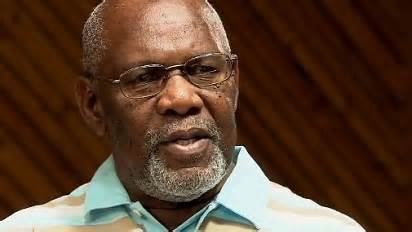


 ZAPU alternate secretary-general, Strike Mkandla (SM) says his party’s main objective in participating in this year’ elections is to continue from where they left in 1987 at the signing of the Unity Accord with ZANU-PF. The Financial Gazette’s this week caught up with Mkandla who is also ZAPU’s National Assembly candidate for Bulawayo’s Pelandaba-Mpopoma constituency. He shared his views on his candidature and ZAPU’s maiden participation in the plebiscite after parting ways with ZANU-PF in 2008.
ZAPU alternate secretary-general, Strike Mkandla (SM) says his party’s main objective in participating in this year’ elections is to continue from where they left in 1987 at the signing of the Unity Accord with ZANU-PF. The Financial Gazette’s this week caught up with Mkandla who is also ZAPU’s National Assembly candidate for Bulawayo’s Pelandaba-Mpopoma constituency. He shared his views on his candidature and ZAPU’s maiden participation in the plebiscite after parting ways with ZANU-PF in 2008.
MT: What is ZAPU’s main objective in participating in this election?
SM: The main aim is to start where we left off in 1987 and to build an alternative to unaccountable and repressive governance. Since we cannot become the majority party on account of fielding candidates in less than half of the constituencies, our first target is to get a sizeable block of seats to make an impact in Parliament and in the provincial councils.
On the policy front there are significant silences in how the new constitutional provision for devolved government will work out in practice. One example is the allocation of resources to the provinces and metropolitan authorities who are guaranteed “no less than five percent of national revenue”.
This essentially leaves a bloated centre and rickety devolved government unless there are strong voices to push for a radical interpretation of that provision. There are also some unfinished business in the area of freedom of assembly and access to information.
MT: How are you planning to improve the lives for Zimbabweans should you win these polls?
SM: We need to give teeth to the devolution provisions where there is an opening in the new constitution to meaningfully empower Zimbabweans by giving them control over government activities, services and local priorities as well as benefits from resources in their areas.
We are not for decentralisation that is given and taken at the whims of some authority and even individual ministers based in Harare. The country’s rich resources are not benefiting the majority of our people. Even poorer countries than us in natural resource endowment are doing better because we have poorer governance. In this regard we shall be fighting to stop corruption which is partly promoted by low accountability and lack of transparency.
MT: Some political observers say the recently signed pact between ZAPU and the Welshman Ncube-led MDC is very weak and will not produce any results. How do you respond to that?
SM: This alliance is the first voluntary agreement between two competing parties on the basis of identified common objectives and principles. It will get stronger because it is not merely for maximising chances in this election only. The ideal situation would have been a common slate of candidates so that we benefit from our combined strengths. We were overtaken by time and the need for mandates to move with the members as negotiations progressed.
The first positive result is the change of mind-set, so that there is nobody that feels ordained to lead the others.
The second positive result is that we are committed to supporting each other’s candidates where only one is standing.
The third is that we have one example of a candidate standing down for another in Bulawayo where ZAPU is supporting David Coltart of MDC. I am sure if there was time this would be replicated by candidates of each party, but one problem here is that we did not develop a mechanism for aggregating the votes in order to gain equitable representation in the seats allocated to proportional representation. In the next elections in 2018 or before we intend to be in a stronger alliance that responds to all the issues raised above. I see us fielding a single presidential candidate then and a common slate of candidate; so this is not a gimmick just for this election.
MT: Your party has been labelled a regional party. How is its support base like outside Matabeleland and the Midlands?
SM: I am intrigued that this question is almost exclusively reserved for parties from the south of the country when there are over 20 registered political parties that have never even attempted to have a base in Matebeleland or the Midlands. It seems that being strong in Matebeleland is considered “regional” and even “tribal” regardless of one’s ideological position. This is even more curious when you consider that since the 1920s most nationally significant trade unions and parties (actually with the exception of ZANU-PF) benefited in their initial stages from committed support and leadership based in Bulawayo.
In the case of ZAPU we have a lot of residual support in many parts of the country which we could not transform into structures because of restrictive conditions and outright fear of victimisation, particularly where ZAPU’s forces did most of the fighting during the liberation war like in Mashonaland West. In this election we have candidates in Harare and one in Manicaland, but we could not muster a nomination drive because of resource constraints.
MT: ZAPU is said to be a party for the elderly. How have the youths from across the country received ZAPU?
SM: ZAPU is a surprisingly resilient idea, given that it has been out of the picture as an independent organisation until 2009. Naturally those who were born and grown up when it was “swallowed up” in 1987 have direct recollection of what it did and how it related to its support base. I have been amazed at how some people under 40 passionately relate to the party’s history and even have “nostalgia” because of what has been passed onto them.
During the conference of the ZAPU Youth Front in April this year youths from all over the country sounded as passionate about the party like the older members, including the women (the Zimbabwe African Women’s Union) who had their conference at the same time and venue. However, the structures are stronger in the south for now like I alluded to in answering your previous question about regionalism.
MT: How is your financial situation affecting your campaigns as the country heads towards harmonised elections?
SM: I have already answered this question in different forms. The long and short of it is that if we had an even modestly better financial base we could have done better where we have good but poorly resourced potential candidates who were put off by the prospect and magnitude of campaigning from personal funds.
MT: What’s next for ZAPU after these polls?
SM: The most immediate thing is that we got a chance to test our structures and how they respond to challenges such as a poor resource base.
We shall immediately prepare for the next elections and also work at the alliance with the MDC for a strong slate of candidates.
The second is to use whatever strength we get to push for real change in people’s lives and the way government relates to them and their priorities. If we gain control in any province it should become a model of how the whole country should be run.